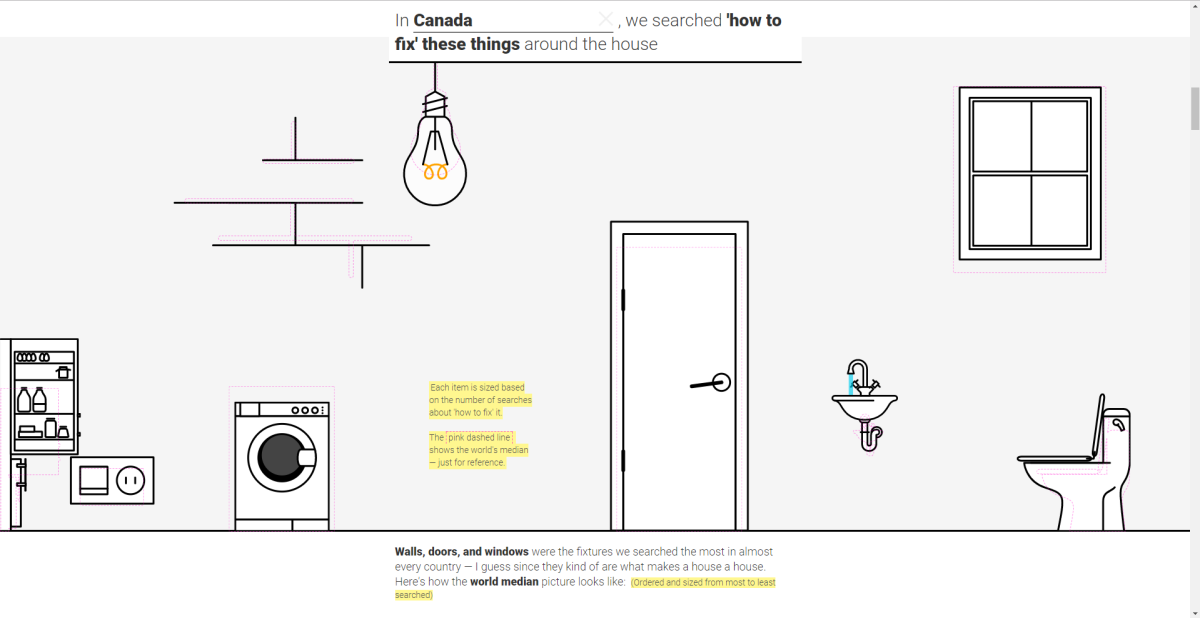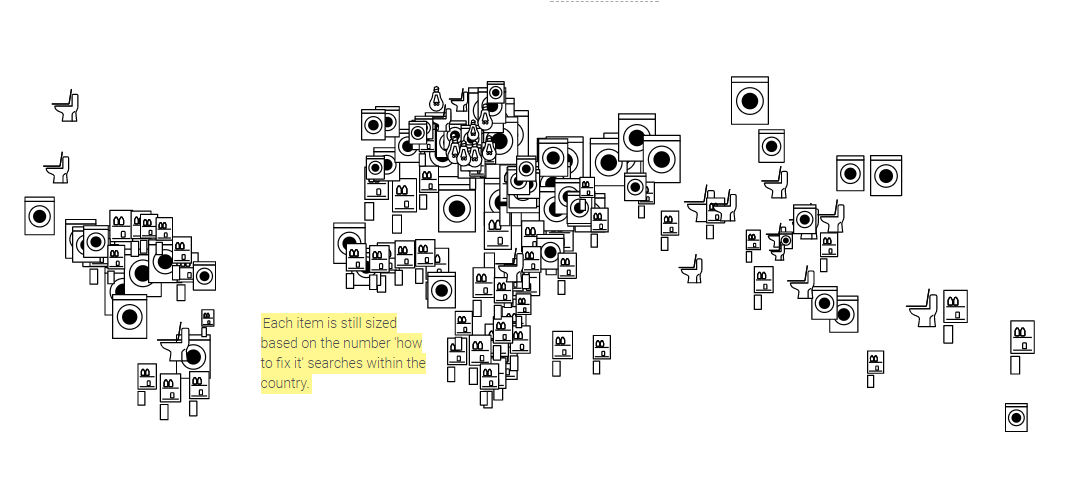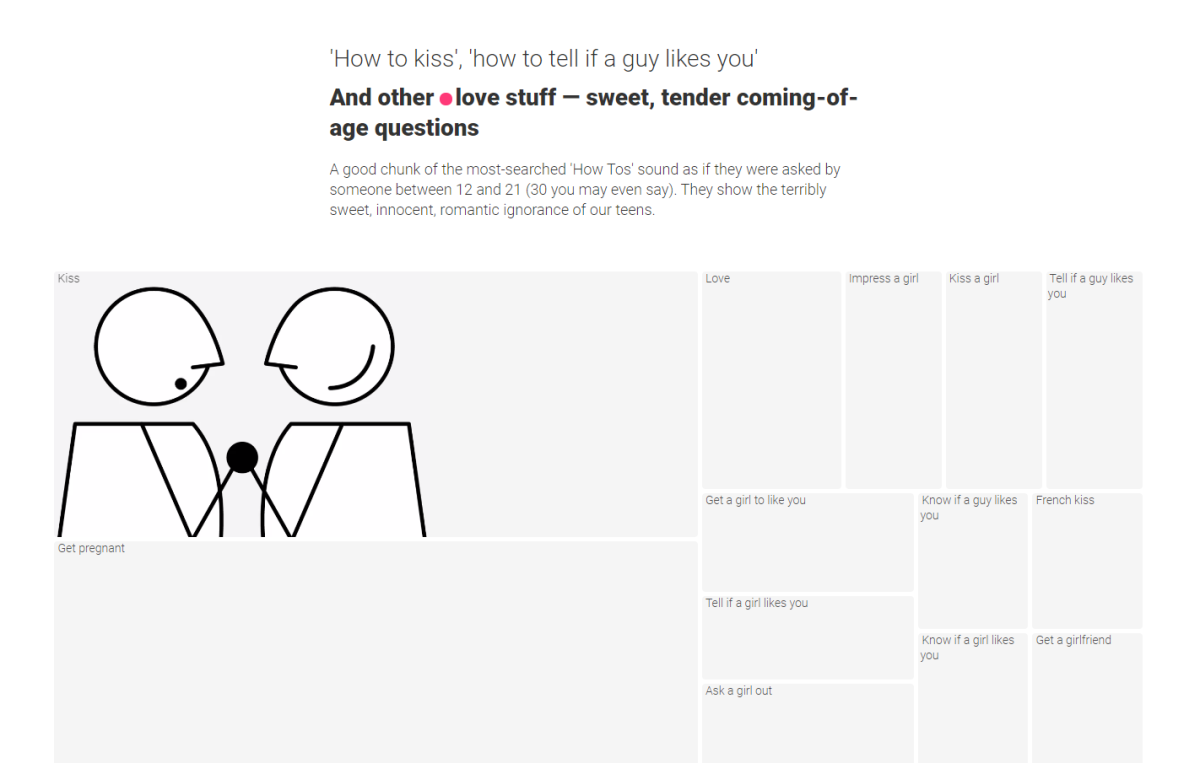According to Google, Canadians want to know how to fix a toilet, a light bulb and a door. In Peru however, most people are curious about how to fix their laundry machine, and barely give the toilet a second thought. In France, it’s all about windows and walls.

WATCH: Google Trekker photographs Alberta habitat for virtual tour

All this data comes to us from the Google News Lab’s latest project — put together in collaboration with interactive data journalist Xaquin G.V. This new website was compiled using search data from Google users wondering “how to” do things.
“If you look in the U.S., how to fix a door is the top thing. In Canada, how to fix a fridge is a bigger deal. There is something really interesting about what it says about each country as well. Google search data is normalized, which means you can compare small countries and big countries, rich countries and poor countries,” said Simon Rogers, renowned data journalist and current data editor with the Google News Lab.
According to Rogers, searches for how to fix things have grown exponentially since 2004.
The new site, entitled How To Fix a Toilet, And Other Things We Couldn’t Do Without Search, is one of many data visualization projects put forth by the Google News Lab, including The Documenting Hate News Index, a look at how Germany is searching for its election candidates, and many others.
“We’ve covered things like the inauguration or food searches over time, or hate crime. This particular project was really around one of the things we noticed was that there was a massive increase in people searching for how to do stuff,” said Rogers in an interview with Global News.
The website, designed by Xaquin, reads like a visual essay that presents the findings of the how-to data grab. Xaquin prefaces the essay by saying he was inspired by his own searches. A series of interactive images are shown as one scrolls down the site, each providing a little more insight into the ways people are placing their trust in Google.
In addition to doing repairs around the house, this initiative revealed that people pose questions about life and love to Search as well. How to make pancakes, make french toast and boil eggs were among the top 100 “how to” searches worldwide. When it comes to matters of the heart, some of the top searches included how to kiss, how to get pregnant, how to love and how to get a girl to like you.
“There’s something really sweet about how we use it to search for how to know somebody likes you, or how to kiss or how to make pancakes, some of those more emotional questions. I guess in the past, we wouldn’t know where to find that. Now, people use Search,” said Rogers.
It’s important to note that according to data from reliablesoft.net, Google dominates the search engine space with a colossal 64 per cent market share — that’s a 43 per cent difference between the Mountain View-based tech giant and its next competitor, Bing.
WATCH: Top drink and food trends in Canada, according to Google searches

Furthermore, Google was recently fined US$2.7 billion (C$3.6 billion) by the EU for the way it shows its products in comparison to others when users search for them. The commission gave Google 90 days to stop showing results from Google Shopping in a box that floats above regular search results, and therefore providing preferential treatment to its own content.
Wired reports that the ruling conflicted with Google’s attempts to evolve Search to the point where it can provide users exactly what they’re searching for.
WATCH: EU fines Google nearly $3.6B for manipulating shopping search results

Beyond gathering insights into the deepest curiosities of Google users, Rogers explained that Search would likely go on to play a significant role in several industries. It’s already playing a role in the changing state of the global news media, and Rogers explains that academics have begun experimenting with the possibilities afforded from Google Search.
“I think it has a lot of implications, like during the elections, we used Google Trends to look at how people searched candidates. Because of the honesty factor of our search, there’s something very powerful there. But at the moment, it works best as a complement to existing things. We still don’t understand fully what it means, the impact, or the power of the search. As we get better at analyzing this data, there are certain things we just wouldn’t be able to find out any other way,” Rogers said.
He explained that the increase in certain search terms is just part of the ever-changing ways that people use Search. What’s to come includes the development of AI, voice search, and “trending topics” that he himself can’t even predict.
One thing, however, is for sure. “We’re all search experts now.”






Comments